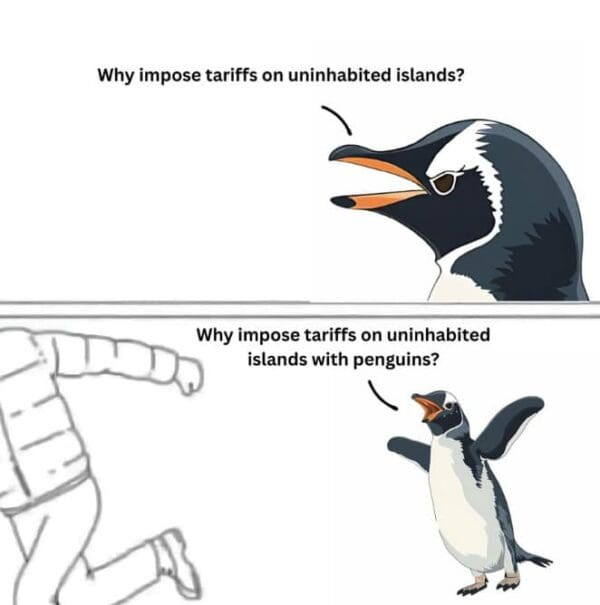Welcome to Quantum Fascism: American Authoritarianism Under Donald Trump
Mark Twain famously said that "History doesn't repeat itself, but it often rhymes"—that's a guiding principle for the emerging political philosophy in the U.S. and beyond.
I first started noodling on this post in February. The official White House X account had just posted a 41-second video titled, “ASMR: Illegal Alien Deportation Flight.” Remember it? In the interminable dog years of Trump’s muzzle-velocity presidency, it genuinely feels like a lifetime ago.
In the clip, shackled immigrants are escorted onto a plane, the sounds of jet engines humming in the background. The post quickly went viral; ASMR (autonomous sensory meridian response) videos are typically considered calming and indefinably pleasurable, and the video paired that experience with the forced removal of human beings, framing the whole thing as frivolous entertainment—though it was anything but.
The cruelty and fear tactics have only intensified in the intervening months. We see it in the disappearing of individuals with no due process, starting with voices calling for an end to the genocide in Gaza (notably Mahmoud Khalil and Rumeysa Öztürk, along with many others); then the revoking international student visas under similiar auspices; and the brutalization of thousands of both American citizens and immigrants—the latter of whom have been sent to horrific detention centers ranging from Florida’s ‘Alligator Alcatraz’ to Ecuador’s Terrorism Confinement Center, or CECOT—a megajail which has been called a gulag—unconscionable in its own right but worse so because many of these people were following the prescribed legal pathway to secure American citizenship.
These efforts have been colored by what we might charitably call incompetence, such as the high-profile deportation of Kilmar Armando Abrego Garcia “because of an administrative error”—but the following attempt to brand him as a criminal and re-deport him tells us that even this “incompetence” is being weaponized as part of an explicit, intentional bid to simply terrorize immigrants.
Though the DOGE frenzy has died down, this “agency” also embodied this spirit: first in its trollish name, then with Elon Musk’s “smash it with a hammer” approach to government “efficiency” (which was anything but efficient, and is now believed to have caused over 600,000 deaths worldwide, including over 400,000 children—and furthermore is projected to cause as many as 14 million deaths through it’s cuts to USAID alone).
Most recently, we see it in the rebranding of the Department of Defense to the Department of War, under whose banner Pete Hegseth and Trump have occupied American cities that they call “enemies,” and branded essentially anyone who disagrees with their policies as terrorists.
All of this is done with a uniting disregard to constitutional law and basic human dignity, often coupled with the cruel “humor” and hand-wavey dismissal of those who call it what it is: abject evil.
It is here that we witness the emerging political philosophy of the United States under MAGA doctrine. The ongoing “will they/won’t they”—which at any given moment doubles as a “can they/can’t they”—creates a form of dysfunction and obfuscation that gets to the heart of our new political reality. It’s the same with Trump’s disastrous tariffs; the goal posts on which tariffs are real, which will stick, and which are up for negotiation have moved so many times it’s not worth cataloguing them all here. We’re left to ask ourselves: How much are Trump and his cronies thinking this stuff through, really?
All of this precarity, it deserves to be said, is being produced by the country that has designated itself the arbiter of the world order for 80 years; it’s unraveling has global impacts at scales that were never before possible. Any of these details in isolation might have historical precedent, but taken together I believe they constitute a distinctly 21st century formation of authoritarianism, which I call quantum fascism.
The Advent of Quantum Fascism
In quantum physics, particles can exist in multiple states at once—a principle known as “superposition”—until an observer measures them. Quantum fascism applies this metaphor to politics. It is a style of authoritarian rule that exists in a superposition of democracy and autocracy—simultaneously upholding democratic facades and violating democratic norms.
Like the famous Schrödinger’s cat thought experiment, a government practicing QF can be both “fascist” and “democratic” at the same time, its true nature collapsing into one or the other only when forced into view. This regime type embraces ambiguity, multiplicity and uncertainty as tools of power, rather than strict ideological consistency. And in keeping with the aspect of superposition, a quantum fascist government weaponizes its own madman theory—leaving the populace confused as to whether they are even considering their own actions in any depth.
Remember the penguin tariffs incident, when Trump levied tariffs on Norfolk Island, a small island near Antarctica whose only inhabitants are penguins? Many wondered at the time if Trump had simply used AI to write his tariff policy—alongside the raft of Executive Orders he dashed off upon entering office in January.
It seems likely he did, but who knows?
In their excellent 2022 book Spin Dictators: The Changing Face of Tyranny in the 21st Century, Sergei Guriev and Daniel Treisman argue that rather than the strongmen of yore, the so-called “fear” dictators, the 21st-century breed of dictator—embodied by Vladimir Putin, Recep Tayyip Erdogan, and Viktor Orbán—seeks to control the information ecosystem. In other words, they fake democracy while enacting autocracy—leaving aside all the time, resource, and labor-intensive aspects of dominating through old-fashioned force.
Quantum fascism extends from this idea—emphasizing the ambiguity of madman theory and outright incompetence, expanding the scope beyond political leaders, embracing digital media ecosystems, and riding a wave of ascendant tech accelerationism. It’s not a formal ideology you’ll find in manifestos; in a sense that would defeat the purpose. It’s politics by vibe, an emergent mode of governing that is perpetually manipulated and refined in real time. If classical fascism was the physics of solid objects (heavy, forceful, blunt in its oppression), QF is politics in the quantum realm: weird, shape-shifting, and hard to measure, and all the more dangerous as a result.
Superposition of Contradictions
A hallmark of classical fascism was a rigid, bombastic ideology (ultranationalism, cult of personality, the Führer’s word as truth). Quantum fascism instead weaponizes inconsistency. The easiest example to pull from here is the January 6 insurrection; an attempted mob coup in the name of U.S. patriotism (including some now infamous images involving confederate flags, bandied about without a single iota of irony). Quantum fascists endorse completely contradictory narratives as needed, and switch between them with little to no consequence. In fact, this confusion is the point; the public should never feel sure about what is “real.”
This is an evolution of what Hannah Arendt observed in mid-20th century totalitarians: that their ideal subject was not the fervent believer but “people for whom the distinction between fact and fiction…and true and false…no longer exist.” Under QF, citizens are bombarded with so many conflicting claims that objective reality fades into a blur. They come to “believe everything and nothing,” Arendt wrote, accepting even obvious lies because “everything was possible and nothing was true.” Quantum fascism has the benefit of social media, the notion of the vibe, and now the advent of powerful generative AI media, which further disorient and blur boundaries (more on that a bit later).
Observer-Dependent Reality
In quantum theory, the act of observation is believed to influences outcomes. Similarly, QF regimes often behave one way under scrutiny and another in the shadows. Publicly, they hold elections and court legitimacy; privately, they may suppress opposition or manipulate results. Rather than formally announce himself dictator, for example, Vladimir Putin simply “wins” elections by landslides every time (he won the 2024 election by an astonishing 88.5%).
When challenged by journalists, courts, or others, officials can abruptly pivot—denying they ever endorsed the previous stance, accusing the observer of bias, or brushing it off as a joke, “locker-room talk,” or bluster. Spokespeople thereby treat press conferences not as a chance to promote clarity about policy positions but as a chance to troll and create soundbites and clips that play to in-groups—which are conveniently assembled and spun by friendly media outlets.
Taken all together, this creates a state of constant flux in which the regime’s actions can’t be pinned down long enough for accountability. This, in turn, fosters hypernormalization, the phenomenon in which people in a given authoritarian society accept a distorted or fake reality as normal because no one sees an alternative, even though they know it’s not real, and this creates a vicious cycle in which any dissent from this obviously untrue narrative is chilled, and more people come to accept the fiction as fact. The term was original coined by Alexei Yurchak, and further popularized by Adam Curtis’s 2016 eponymous documentary:
To Recap
A definition of quantum fascism includes two related ideas:
1) Quantum fascism describes the phenomenon when fascism and democracy exist in a state of superposition.
2) Quantum fascism describes an emerging political and cultural condition characterized by power structures that operate through deliberate ambiguity, radical uncertainty, and the exploitation of indeterminacy, conceptually mirroring quantum theory’s notions of superposition, entanglement, and observer dependence.
QF is a framework through which we can critically examine the contemporary evolution of authoritarianism in the digital and information age, highlighting how political authority increasingly thrives not on fixed certainties, but rather on pervasive instability, contradiction, and confusion. Quantum fascism suggests political power that strategically maintains a similar state of suspension—where truth, reality, and certainty are intentionally blurred, only solidifying momentarily and contextually when politically convenient.
Late Fascism, Meet the Internet
Ideas like Giorgio Agamben’s state of exception; Jean Baudrillard’s hyperreality and simulacra; Guy Debord’s spectacle; Michel Foucault’s “disciplinary power” and panoptic surveillance, and Slavoj Žižek’s “ideological cynicism,” among others, are all within the conceptual DNA of quantum fascism. I’ll do a later post diving into all of these, but what I specifically want to address here is how quantum fascism builds on what political theorist Alberto Toscano calls “late fascism,” a 21st-century adaptation of the 20th-century construction.
In late fascism, Toscano argues, fascism is stripped of its old-timey costumes and synchronized marches, finding new expressive modes to thrive within global capitalism and mass media—but nevertheless continues to manifest as a toxic convergence of racism, nationalism, corporatism, and state power. Unlike mid-20th-century fascists, today’s authoritarian leaders often operate through legal loopholes, memes, and manipulated elections rather than outright coups. They are, in Toscano’s estimation, symptoms of the obsolescence of the old political order, blurring traditional lines of left and right, public and private.
I really encourage you to read Late Fascism in full, as it’s been incredibly illuminating in my own intellectual journey. Where QF extends this line thought is how new technologies enforce these quantum-like qualities of ambiguity and multiplicity at scale.
Classical fascists controlled the narrative by censoring or eliminating opposing voices—burning books, jailing dissidents, cutting off the radio. Quantum fascists don’t shut down the internet or TV; they flood the zone to distort it. They use algorithmic targeting to send tailored messages to different groups, so citizens no longer even consume the same reality. A single political figure can appear as a moderate centrist in one Facebook ad and a fire-breathing nationalist in another, with different voters each receiving the version that will sway them.
For a sense of how the information ecosystem has evolved in the digital age, check out my conversation with Renee DiResta on Urgent Futures:
Micro-targeted advertising and social media echo chambers enable a kind of political superposition: multiple personas and policy positions can exist for the same candidate. In election campaigns, this tactic has been weaponized. During the 2016 and 2020 U.S. elections, for example, disinformation teams (some foreign, some domestic) flooded social platforms with millions of ads and posts catering to niche audiences—sometimes spreading completely contradictory messages. Voters effectively lived in parallel universes of information.
Deepfakes and other forms of AI-generated media expand this scope of disinformation potential, not only allowing rapidly distributed content to ride algorithmic rails, but also creating a space where any given photo, audio, or video file—even those that were genuinely captured by a person in physical space—can be dismissed as fake, produced in service of a “witch hunt.”
Jacob Ward and I went deep on this in a recent episode of Urgent Futures:
A quantum fascist leader need not reconcile these universes; he (and quantum fascists are indeed overwhelmingly men) inhabits all of them at once—benefitting wherever possible and dismissing any accusations of contradiction. The point is the vibe, not the researched argument—and the result is epistemological vertigo for the public. As we know from history, that vertigo makes for fertile ground for authoritarians.
These information operations—deliberately engineered with quantum ambiguity—ensure the populace cannot collectively agree on basic facts, shared realities, or coherent narratives. Power structures thus create and maintain political “superpositions”—simultaneous, contradictory realities—collapsing into stable forms only momentarily and strategically when politically advantageous.
Learn about the current state of the information warfare in the U.S. from this Urgent Futures conversation with Nina Jankowicz:
In so doing, quantum fascists foster widespread epistemological fatigue and resignation. People begin to experience reality itself as radically unstable, perpetually indeterminate, and beyond grasp. Unable to anchor themselves in stable truths, individuals become ever more atomized, cynical, and vulnerable to charismatic authoritarian figures who promise simplicity amid complexity, certainty amidst ambiguity.
Collapsing Quantum Fascism
Traditional Enlightenment values—objective truth, transparent information, coherent rational discourse—prove inadequate in a technologically mediated quantum fascist context (to say nothing of the ways these ideas have been applied for oppressive ends). Quantum fascism doesn’t require total control through a unified narrative, but total uncertainty through an infinity of plausible ones. Familiar instruments of fact-checking, outrage, and moral persuasion remain important, but ultimately won’t rescue us to a more liberatory system of governance.
Bullshit noise can be created far faster (and thus spread far wider) than true signal. Collective consensus and epistemological resilience are degraded, reducing the possibilities of shared meaning-making. The crisis is not simply that people are being lied to; it is that the very conditions under which truth might matter are being actively dismantled.
I won’t sugarcoat this: effectively counteracting quantum fascism will be neither simple nor easy, and it’s unclear we will be able to do so in any near-term scenario. Furthermore, it would be impossible to prescribe all the interventions that will be necessary here. Instead, I want to briefly sketch what I believe our broad-level strategy should be.
Our strategic aim shouldn’t be to restore some mythical age of certainty, but rather to reclaim the capacity to collectively see and name what is before us, even amid contradiction, and build adjacent systems that hold more appeal than strongmen.
The antidote to quantum fascism isn’t nostalgia, but the collective construction of new networks of trust, accountability, and meaning-making that form “small islands of coherence.” If we want to get back to functional government—whatever that might mean—we will have to transmute the very indeterminacy used as a weapon of control into a space for undertaking critical imagination, pluralism, and care.
Inevitably, fighting any kind of fascism starts with your own mental and emotional health amid turmoil—Anya Kamenetz has some critical information to share on how we do that, individually and collectively:
To say it plainly: our goal isn’t so much to counteract QF (though, sure, that too!) but rather to build out infrastructures that make their own arguments for solidarity—spaces where collective action yields tangible benefit for those involved, and thus becomes appealing to a broader base of people. Only then can the proverbial waveform of our present politics collapse into something beneficial and life-giving.
Here are some other episodes of the Urgent Futures Podcast that enrich the above:











This is a truly inspired way to explain how fractured the system has become and why it persists. How can anyone be held accountable when plausible deniability is the norm? No collapse, no measurement. But the proposed solutions are things we can all work on together to build hope, heroism, and new realities.♥️⚛️
Excellent analogy / term 👌🏻 Great post, thank you.